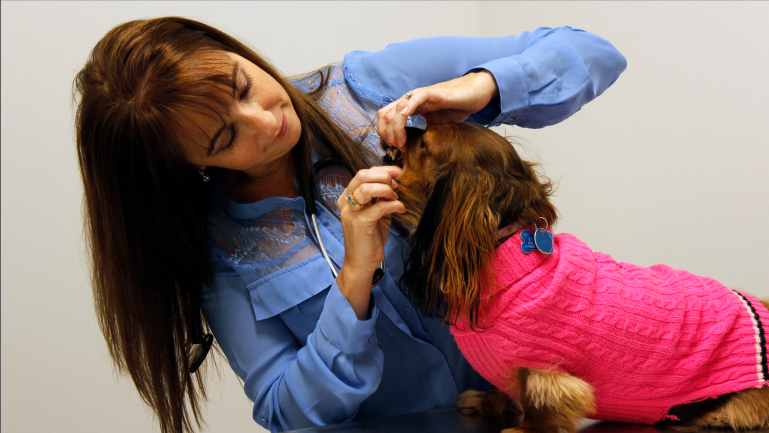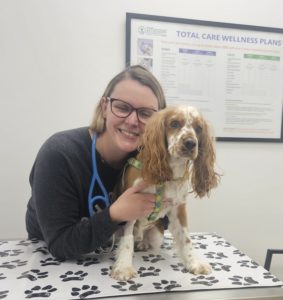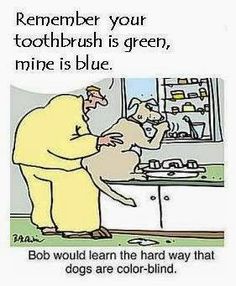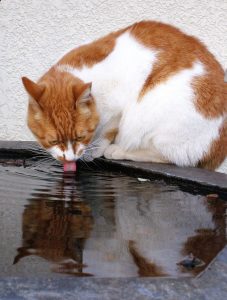Why Dental Health Is Important for Your Pet
As much as we love getting kisses from our pets, no one especially enjoys getting a whiff of Fluffy’s bad breath. What many do not realize however, is that there are more serious health implications due to this bad breath than simply being unpleasant to be around. Dental health is a crucial part of your pet’s overall well-being. The health of your pet’s mouth can indicate (or cause) other serious health problems for them.
About 80% of dogs and 70% of cats over the age of three suffer from significant oral disease.¹ In fact, periodontal disease is the most common dental condition in cats and dogs.² Not only will periodontal disease cause your pet discomfort and make eating difficult, it can also lead to many other health issues. Problems with your pet’s kidneys, heart, and muscles are often associated with periodontal disease.² Pets with root exposure, plaque buildup, receding gums, and/or inner lip ulcerations run the risk of toxic absorption into the blood. They are also at risk of contracting a bacterial infection, as bacteria can enter the blood stream through oral lesions. Kidney damage and joint problems are a typical consequence of this, as is a condition called bacterial endocarditis (where bacteria settle and reproduce in the lining of the heart).² If left untreated, this can be fatal for cats and dogs.
Dental health is not a luxury nor is it optional. Maintaining your pet’s oral dental health needs to be just as much a priority as other aspects of their health. With routine check-ups and daily home care, your pet can avoid many serious (and highly preventable) diseases and conditions.
Things to Look For
Be careful when examining your pet’s mouth for these indicators of disease; even the most docile pet can become irritable and likely to bite when they are experiencing pain.¹
If your pet is exhibiting any of the following symptoms, you should schedule an appointment with your vet as soon as possible.
- Bad breath
- Yellow-brown tartar
- Bleeding/bloody gums
- Inflamed gums
- Loose Teeth
- Excessive Drooling
- Difficulty chewing or a change in eating habits¹
Like with any disease, the sooner dental disease is detected, the more effective treatment will be. Never hesitate to contact your veterinarian if you suspect something may be wrong with your pet’s health (dental or otherwise).
What You Can Do
Be sure to incorporate dental checks at your pet’s annual check-ups. Your vet is equipped to give your pet’s teeth a thorough cleaning and detect signs of tartar/plaque buildup or dental disease early on. If your pet does not need a root canal procedure, or need to have a tooth capped, then the procedure is typically quick and simple.² Most vets use an ultrasonic instrument to separate plaque from the teeth.² Most dental procedures will require your pet to be put under anesthesia and may need to have x-rays performed. No matter which procedure is performed, they are all paramount to your pet’s overall health.
In between visits, you should brush your pet’s teeth every day. This may seem excessive initially, but keep in mind that the bacteria that cause dental disease can spread and recolonize a pet’s tooth within 24 to 36 hours.1 The fact of the matter is, brushing your pet’s teeth once a week is not going to cut it. Soft-bristled toothbrushes or a finger brush and toothpaste specially formulated for pets can be used for daily cleanings. The trick is to work gradually. If your pet shows no interest or even distrust of the toothpaste, it is perfectly okay to start with just a brush.¹ If your pet is still hesitant, start by simply acclimating your pet to having their mouths touched. Even the most finicky pet can adjust to having their teeth brushed if you just use a bit of patience and time. When you eventually get a toothbrush into their mouth, work it in a circular motion along the outside surfaces of the teeth and gums, aiming to spend about 30 seconds on each side of the mouth.
You can find a variety of chew treats or special dry foods designed to improve your pet’s periodontal health. While you should consult your veterinarian first to see if a special diet is necessary for your pet, dental treats are a good way to get your pet to participate in their own dental health.
Sites Referenced
- Tue Jul 28 17:42:00 EDT 2015. “4 Essential Tips to Care For Your Dog or Cat’s Teeth.” Vetstreet, www.vetstreet.com/our-pet-experts/essential-tips-to-care-for-your-pets-teeth.
- “Pet Dentistry: Why Dogs (and Cats) Need Dental Care Too.” PetMD, www.petmd.com/dog/grooming/evr_dg_pet_dentistry?page=2.







